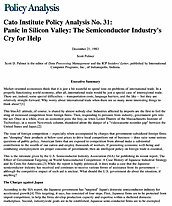Market-oriented economists think that it is just a bit wasteful to spend time on problems of international trade. In a properly functioning world economy, after all, international trade would be just a special case of interregional trade. There are, indeed, some special difficulties — transportation costs, language barriers, and the like — but they are relatively straight-forward. Why worry about international trade when there are so many more interesting things to think about?[1]
This blasé attitude, of course, is shared by almost nobody else. Industries affected by imports are the first to feel the sting of increased competition from foreign firms. Then, responding to pressure from industry, government gets into the act. Once in a while, even an economist joins the fray, as when Lester Thurow of the Massachusetts Institute of Technology, in a recent Newsweek column, thundered about the danger of a “videocassette recorder gap” between the United States and Japan.[2]
The issue of foreign competition — especially when accompanied by charges that government-subsidized foreign firms are “dumping” their products at below-cost prices to drive local competitors out of business — does raise some serious questions of public policy. American firms that are exposed to competition from abroad make a substantial contribution to the wealth of our nation and employ thousands of workers. If promoting economic well-being and combating unemployment are proper concerns of government, then an intelligent policy on foreign trade is essential.
This is the rationale given by the U.S. Semiconductor Industry Association (SIA) for publishing its recent report, The Effect of Government Targeting on World Semiconductor Competition: A Case History of Japanese Industrial Strategy and Its Costs for Americans.[3] While the report is highly polemical, it does make a case that the Japanese semiconductor industry has received and continues to receive various forms of assistance from its government — although the competitive impact of such aid is unclear. What should the U.S. government do about the situation, if anything?
About the Author

This work is licensed under a Creative Commons Attribution-NonCommercial-ShareAlike 4.0 International License.
